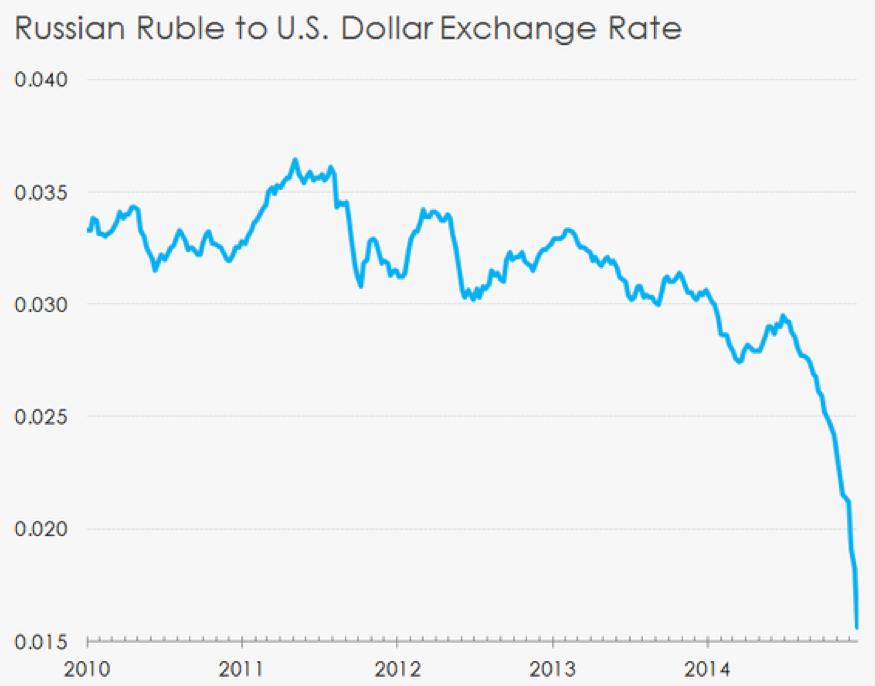On this past Thursday, August 27, Russian Internet brought to its readers sensational news: a real currency panic had begun in Russia! At the end of the day, just in Moscow alone, people withdrew from their bank accounts more than six and a half billion euros and a little less than four billion US dollars. By this action Russians finally reacted to the events of the previous several days.
As global markets fell on Black Monday August 24, currencies followed. The Russian ruble set a historic low, losing more than 20% in a day. The ruble’s 70.75 exchange rate against the US dollar was announced by the Central Bank, a rate not seen even during last December ruble plunge.
Monday night, the Central Bank boosted a key interest rate from 10.5% to 17% in hopes investors would hold onto their rubles to get higher returns. The ruble rebounded briefly Tuesday morning, but by midday it plunged anew to a record low of about 72 to the dollar.
The collapse of ruble came after its long decline that started several years ago.
In its detailed coverage of the Russian currency crises USA Today quotes the Russian Central Bank Deputy Chairman Sergei Shvetsov:
“The situation is critical, as Russia faced its worst financial crisis since a debt default in 1998. Even in our worst dreams we could not have imagined a year ago that something like this was possible.”
Many Russian commentators share pessimistic point of view of Sergei Shevtsov. Here are comments of a couple of the most prominent representatives of democratic media.
Aleksei Venediktov, editor in chief of the Ekho Moskvy radio station:
“The Kremlin powers, large and small ones, are fighting one against another as always. But if in the past these battles were waged for influence over their boss, now they are being conducted over how to get away from him. This has to be done gracefully, as no one wants to be charged with desertion.”
Political analyst Andrei Piontkovski: “The atmosphere in Kremlin today reminds the atmosphere in Hitler’s bunker prior to capitulation”.
Russian official press and TV don’t share the pessimism of many experts. State officials keep appearing and are extremely optimistic, trying to find positive sides of the crisis.
Deputy Prime Minister Dmitry Rogozin shared with RIA Novosti an idea, that
the fall of the ruble will have a positive impact on the export of Russian weapons and armaments abroad. He said:
“It will be beneficial for our defense industry for the simple reason that it will be beneficial for our exporters. We are now firmly standing in second place for the sale of arms abroad, earning about $15 billion annually on the arms market, so that the change rate of the ruble will make our supply more beneficial for our industry.”
Ordinary Russians are worried about growing of prices for food, utilities and transportation and they are trying to survive, exchanging their ruble savings to dollars and euro. But most of them don’t blame Putin for their problems.
Putin’s popularity ratings fell a little this month. But they still remain extremely high by both international and historical standards.
A poll by the Public Opinion Foundation shows that 72% of Russians would have voted for Putin in August, down from 76% in May.
Another poll, by the Levada Center, indicates that 83% of Russians approved of the President’s actions in August, down from an all-time high of 89% in May.
So who do most Russians blame for their problems?
Here is a transcript of a chat in a car of a Russian train, recorded by my friend in Moscow several days ago:
“The quality of education is falling, they are making morons out of people”, said a young man, a journalist from the city of Vologda.
“And what about the medicine?” a tanned handsome man of about fifty, a resident of a small town near Cherepovets said. “I remember there was a doctor in every town. And now we have nothing. If one gets sick, one needs to go to Vologda, Cherepovets is closer, but Vologda is the regional center and officially we are attached to a clinic over there.”
“All the towns in rural areas are abandoned”, added the young journalist.
The man from a small town disagreed: “It is good in the country… I love it. I remember the past: all the fields have been planted, there were a lot of cows, many roads were good, and now there are only trees, and grass full of ticks. Before they used sprays against ticks and cows trampled them. And now, I even don’t know how they make their famous butter in Vologda without cows…”
Two men stayed silent for several minutes, thinking.
“That would seem” started the young journalist, “America is a very rich country, they are pigging out over there. What do they want from Russia all the time? Why they will not let us leave in peace?”
“They want to enslave us” the older man nodded. “But we will not let them!”



